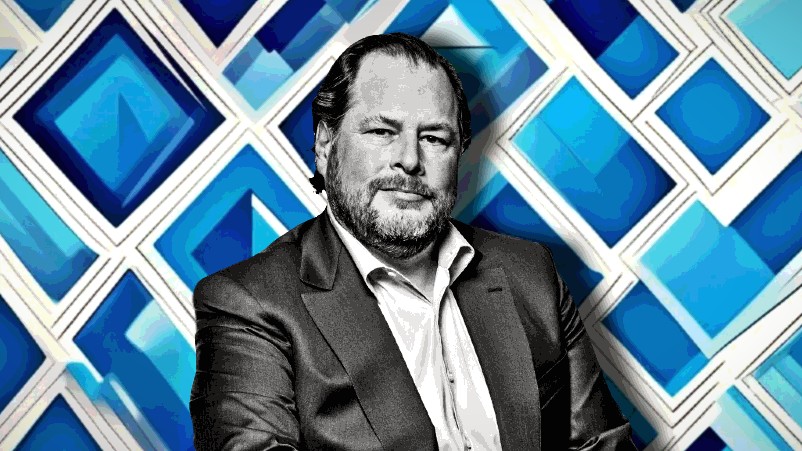Salesforce’s Benioff delivers blistering wrap on Microsoft-Open AI accuracy, declares co-pilots the ‘next Clippy’ as reasoning, ‘autonomous agents’ create new business workforces

Salesforce CEO Marc Benioff: “I really think that Copilot is the next Clippy … this idea that it hasn't really delivered for customers what they intended. It's cute, it's fun, does some things... and then you're not really using it.”
Salesforce CEO Marc Benioff was itching for a street fight with Microsoft and Open AI at a press conference earlier this morning in San Francisco after his “Dreamforce” conference keynote. He claimed the “third wave of AI” had started with reasoning autonomous agents that blended with humans in meetings across every company function was already delivering substantial gains in early trials with Saks Fifth Avenue, Gucci and publishing firm Wiley. Benioff launched the company’s “Agentforce” this morning – the most important in Salesforce's history, he said – which sets autonomous agents into companies trained for business outcomes, not language processing.
They can deploy autonomous agents that understand their business context and can take meaningful actions without constant human oversight.
Despite massive interest, investments and grandiose promises, many AI solutions are failing to deliver tangible results for companies and the short era of business “DIY AI” is over, Salesforce CEO Marc Benioff told a media conference this morning.
"There's a lot of narratives out there from vendors, and a lot of it is not true,” he said, assigning Microsoft's much-hyped Copilot AI as just another much-maligned Clippy assistant. “I really think that Copilot is the next Clippy … this idea that it hasn't really delivered for customers what they intended. It's cute, it's fun, does some things... and then you're not really using it.”
He also responded to a question about Microsoft's competitive jabs last week and why it was "so mean to Salesforce": "Well, they are mean people...but they have been for 40 years," Benioff said, dropping expletives and suggesting journalists look at an EU report on Microsoft's competition practices. He jazzed media up to push rigorous testing and comparisons on accuracy and hallucinations between Salesforce and rivals.
The targeting of Copilots was a calculated move by Benioff to position Salesforce's new Agentforce as the next evolution in enterprise AI, leaving copilots for the AI wilderness. Salesforce claims that its AI models can learn and adapt in real-time based on business outcomes, a feature that sets it apart from many other LLMs.
Benioff said the next evolution beyond traditional large language models (LLMs) is to what he terms "large action models.” It moves from systems that primarily understand and generate language to those that can take concrete actions in business environments. A live demo with Saks' autonomous agent "Sophie" at a customer call centre saw human-like conversation flow, apparel size suggestions made based on Sophie's access to the customer history and then switch the call instantly to a human customer service representative when questions around faster delivery fell outside the scope.
"So the large action models, essentially, are models which are trained to perform actions in the real world," Benioff said.
Clara Shih, CEO of Salesforce AI backed the case. “While everyone else in the industry is talking about reinforcement learning from human feedback, we have pioneered reinforcement learning from customer outcomes,” she claimed. “All of the customer outcomes you have … whether it's marketing conversion rates or sales, deal wins or service resolutions, all of that is used to continuously tune and improve your Agentforce.”
The super sell from Salesforce was that it has connected up all parts of the organisation via its Data Cloud and now serves as a central bank for its new autonomous Agentforce to reason, make decisions and take action.
Benioff repeatedly in his keynote urged businesses to break what he called the "hypnosis" of DIY AI approaches – he argued that many companies are stuck in a mindset that they need to build everything from scratch when the era of cobbling together AI solutions in-house is over.
Salesforce's answer to what Benioff sees as a market flooded with underperforming AI solutions is autonomous agents powered by large action models which are designed to reason, plan, and take concrete actions within business systems. The key difference being that these agents are deeply integrated into existing business processes and data systems and are unlike standalone AI models or copilots that require extensive customisation.
Benioff also said Salesforce’s AI is designed to work out of the box with a company's existing Salesforce implementation and is beating Google, Open AI and Microsoft on accuracy and hallucinations by “two times”.
"Why would our agents have so low hallucinogenics, [be] so accurate? Well, it has to do with the platform – it's because we have the data and the metadata and the workflow and the business process and the security and the sharing model … it turns out those things make a more accurate AI.”
Businesses no longer need to build AI solutions from scratch or struggle to integrate disparate AI tools he reiterated. “Instead, they can deploy autonomous agents that understand their business context and can take meaningful actions without constant human oversight.
"I read that Gartner report last week about those nasty copilots and they were spilling data all over our customer scores. That is no good for our customers. That's not the kind of business we run."



